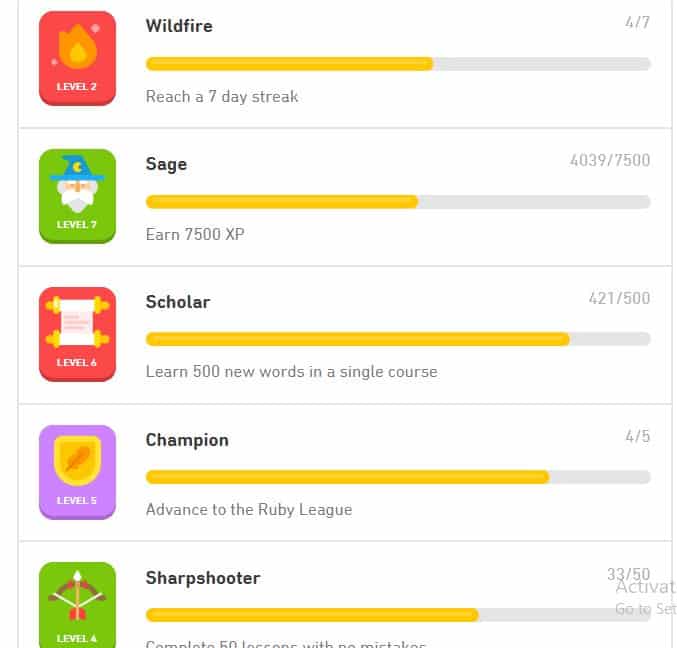Millions of people worldwide have signed up for Duolingo, thanks to its gamified user interface and engaging lectures. Earning Experience Points (XP) on Duolingo becomes crucial to language learners’ success as they begin their language-learning adventures. XP acts as a gauge of educational activity and encourages students to maintain consistency and engagement. Today, we will see practical ways on how to increase XP in Duolingo fast. Understanding how to maximize XP accrual will help you get the most out of your time on Duolingo, whether you’re a beginner or an expert student.

Understanding XP in Duolingo
Experience points, sometimes known as XP, are important components of the Duolingo environment. It measures your use of the site and your progress in learning. You advance to new XP Duolingo levels, get accolades, and show your commitment to learning a new language as you gain XP.
In Duolingo, gaining XP is generally accomplished by passing quizzes and courses. You get a certain amount of XP depending on the complexity of the lesson for each successfully finished lesson. You advance through the language tree progressively the more lessons you finish and earn XP for.
Different ways to earn XP
Earn XP is by achieving daily goals. Duolingo invites users to create daily XP objectives based on their preferences and time available. You get extra XP for being consistent and dedicated by reaching or exceeding your daily objective.
One feature of Duolingo that helps users earn XP is maintaining streaks. Streaks show how many days in a row you practiced on the platform without missing a session. The more additional XP you get, the longer your streak must be. Streaks can be a strong motivator since they push you to practice often and keep your study schedule consistent.
Leveling up in talents also helps you acquire XP in addition to finishing lessons and keeping streaks. A language course’s skills are its separate parts, which concentrate on certain vocabulary, grammatical rules, or linguistic ideas. Your language abilities will advance as you complete the courses, master the skills, gain XP, and unlock new material.
Gain Extra XP
Additionally, Duolingo offers chances to gain additional XP to improve your learning process. Participating in special events like challenges or competitions might earn extra XP in Duolingo. Participating in these activities increases your XP total while also bringing excitement and competitiveness to your language-learning process.
Duolingo’s XP is a useful statistic, but it shouldn’t be the only indication of language skill. XP only evaluates platform engagement and consistency, whereas learning a language involves several abilities. Skills like listening, speaking, reading, and writing may require additional practice outside of the Duolingo environment.
Understanding Duolingo’s XP system helps you plan and improve your learning. We’ll discuss ways to boost your XP count to help you reach your language-learning goals in the following sections. From establishing realistic objectives to adding extra features, we’ll show you how to maximize your XP and profit from Duolingo’s gamified language-learning platform.
How to get an XP Boost in Duolingo?

Setting realistic objectives is essential for keeping motivation and making steady progress while learning a language. The same idea holds true for Duolingo’s XP system. You can efficiently measure your progress and maintain interest in your language learning journey by establishing attainable objectives. Here are some key considerations for setting realistic XP goals:
- Determine Your present competence Level: To start, determine your present level of language competence. You can determine where you are and create objectives that are compatible with your skills with the aid of this self-evaluation. Take into account elements like vocabulary proficiency, mastery of grammar, and general understanding.
- Think About Your Time Availability: Consider how much time you have available to invest in Duolingo by assessing your daily routine. Be sincere with yourself and allot time for language practice that is reasonable. It is preferable to practice for shorter periods of time on a regular basis rather than trying to practice for larger periods of time.
- Start with Small Incremental Goals: Start with more manageable XP objectives. You can build momentum and enjoy frequent triumphs by setting reasonable goals. Increase your XP objectives progressively as you advance and become more at ease to further push yourself.
- Strike a Balance Between Challenges and Realism: While it’s important to push yourself and set lofty goals, it’s also crucial to have a healthy sense of perspective. If your objectives are frequently out of reach, they may cause you to get frustrated and demotivated. Find a balance between being overwhelmed and being challenged.
- Break It Down: Divide your desired amount of XP into more manageable milestones rather than concentrating only on it. Your overarching aim may be broken down into manageable weekly or monthly objectives. This strategy enables you to monitor your development and modify your efforts as necessary.
Remember that establishing realistic objectives creates a pleasant learning environment that fosters persistent effort and development. You’ll stay motivated on Duolingo by creating achievable objectives.
XP Distribution to Think About: Pay close attention to how XP is distributed across the Duolingo classes. While some lessons may provide more XP, others could award less points. Consider this while defining your objectives and give lessons with greater XP returns more time.
Being adaptable and making necessary adjustments is important since learning a language is a dynamic process. Don’t be afraid to change your original objectives if you discover that they are either too difficult or not difficult enough. Adapt your objectives to your changing language abilities and personal situation.
Avoiding XP Misconceptions
Although XP is a crucial component of Duolingo and may be a helpful tool for measuring your progress, it’s crucial to avoid certain common misunderstandings and to understand the limits of XP as a gauge of language skill. Here are some common misconceptions to be aware of:
- Quality of Learning vs. Length of Practice Sessions: It’s important to place an emphasis on the quality of your language practice rather than just striving for longer practice sessions to gain more XP. Shorter periods of concentrated practice with no interruptions may often be more fruitful than longer ones. When you practice, put understanding, accuracy, and engagement first to get the most out of your language learning.
- Using XP as Your Only Metric for Progress: XP might give you a feeling of success and inspiration, but it shouldn’t be your only indicator of how well you’re learning a language. Language proficiency comprises a range of abilities, including speaking, listening, reading, and writing, which could not be well represented by XP alone. Take into account other aspects, such as your capacity for conversation, comprehension of native speakers, or written expression.
- Language Depth vs. XP Quantity: Duolingo provides a variety of courses and abilities, however finishing a lot of lessons does not ensure that you grasp the language in-depth. It’s crucial to strike a balance between breadth and depth while learning a language. Instead of racing through classes in order to obtain XP, spend some time reviewing and solidifying your knowledge. Focus on understanding and remembering the information.
- Supplementing Duolingo with Other Resources: Duolingo is an excellent tool for language learning, but it shouldn’t be your only option. Duolingo concentrates on vocabulary, grammar, and fundamental language abilities, but it’s crucial to combine it with additional resources like speaking with native speakers, reading real books, having discussions, or enrolling in formal language programs to achieve a well-rounded competency.
- Duolingo offers a structured curriculum, but every student has unique strengths, limitations, and learning preferences. Re-visit difficult classes, concentrate on areas that need development, and include extra materials that are suited to your particular requirements to personalize your educational experience. Accumulating XP is a necessary element of the trip, but learning that is tailored to your unique objectives and tastes is essential for long-term advancement.
By understanding these misconceptions and limitations, you can approach XP accumulation on Duolingo with a balanced perspective. Treat XP as a motivator and progress indicator, but keep in mind that actual language fluency comes through thorough study that incorporates other skills and resources beyond the purview of Duolingo alone. Use XP as a guide while maintaining your attention on the overarching objective of developing language proficiency and self-assurance.
How to get 3000 XP in Duolingo fast?

Quickly gaining 3000 XP in Duolingo demands consistency and dedicated work. Here are some tactics to assist you in successfully achieving that objective:
- Make time specifically for studying: Establish a set time each day for Duolingo practice to guarantee consistent participation and advancement.
- Complete courses with higher XP: Pay attention to lessons with more XP benefits. To get XP more quickly, choose courses with longer sentences or harder topics.
- Set a higher daily XP objective that encourages you to practice more in order to meet or surpass your daily XP target. You will get XP more quickly if you consistently achieve or exceed this objective.
- Take mastery tests to test your knowledge after you’re comfortable with a skill. You may swiftly level up your talents and earn more XP by doing mastery quizzes.
- Attend events with Duolingo: Take part in Duolingo’s events, challenges, or contests. You may get XP more quickly thanks to the additional XP possibilities these occasions often provide.
- Maintain a streak: Work on maintaining a streak every day. The more XP you get as a streak bonus the longer your streak lasts, which adds a lot of XP to your overall XP total.
- Take advantage of Duolingo’s mobile app features, like as quick practice sessions while waiting around, by using them. You may get XP throughout the day by participating in these brief sessions.
- Consider Duolingo Plus: Duolingo Plus offers benefits such as XP boosts. Due to the extra benefits offered by a Duolingo Plus membership, XP can be earned more quickly.
- Stay focused and minimize distractions: When practicing on Duolingo, eliminate distractions and create a conducive learning environment. You’ll be able to concentrate better and finish classes more quickly as a result.
- Review and revision: Consistently go over and rewrite what you’ve already learnt. You will learn more quickly and remember it thanks to this reinforcement, which will also result in more experience points.
Why is XP boost in Duolingo not working?
Here are some actions you might do to troubleshoot the XP boost function in Duolingo if you’re having difficulty with it:
- Verify your Duolingo Plus membership: Make sure your Duolingo Plus membership is active. XP boosts are a premium feature available exclusively to Duolingo Plus subscribers.
- Verify the account status: Verify again that your Duolingo Plus membership is still in effect and has not yet expired or been terminated. You may check this by visiting to your account settings or requesting help from Duolingo support.
- Update your Duolingo app: Make sure you have the latest version of the Duolingo app installed on your device. Older versions sometimes may interfere with key functionality, notably XP bonuses. If necessary, update the app from the app store on your smartphone.
- Log out and back in: Resolving technical difficulties sometimes involves signing out of your Duolingo account and then logging back in. To test whether the XP boost feature resumes functioning, try logging out of your account, quitting the app, opening it again, and re-logging in.
Clearing the Duolingo app’s cache and data may assist in resolving any transient conflicts or problems. Clear the cache and data for the Duolingo app by going to the settings section of your smartphone. Please be aware that doing this may reset any personalized app preferences or settings.
Conclusion | How to increase XP on Duolingo?
In summary, gaining XP in Duolingo involves a mix of commitment, calculated preparation, and regular practice. You can maximize your XP accrual by making reasonable objectives, making use of extra features, and being active on the site. It’s important to keep in mind, too, that XP does not assess total language competence.
There are several abilities involved in learning a language that go beyond what can be measured by XP. Embrace the gamified nature of Duolingo, but always prioritize comprehensive language learning to achieve true fluency. Maintain your motivation, keep practicing, and enjoy the process of learning a language.
FAQs
The complexity of the courses, the amount of time you practice, and your language learning objectives affect how long it takes to gain XP in Duolingo. Studying and practicing often might help you get XP quicker.
Yes, you can earn XP without a Duolingo Plus subscription. Duolingo Plus improves XP and removes ads, but it’s not required to gain XP. Complete courses, fulfill daily objectives, maintain streaks, and level up abilities to gain XP, which is accessible to all Duolingo users.
Make sure you are first online since progress made offline may not sync right away. Additionally, verify that the time and date settings on your device are accurate, since errors might interfere with XP updates. If the issue continues, try signing out and back in to your account or getting in touch with Duolingo support for further help.
XP boosts in Duolingo are designed to accelerate XP accumulation, but they do not directly impact language learning progress or proficiency. While XP boosts can motivate you to practice more frequently, it’s important to focus on the quality of your learning, comprehension, and retention of the language material to ensure true progress in language learning.

Meet Bill, a French language teacher and blogger who specializes in testing various language learning apps. He has been teaching French for nearly 4 decades and holds a Bachelor’s degree from Manhattanville College. With a passion for technology and how it can enhance language learning, Bill has spent years testing and reviewing different language learning platforms. His blog provides valuable insights into the pros and cons of each app, as well as tips for language learners of all levels.
